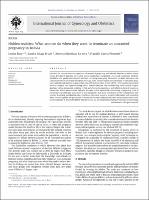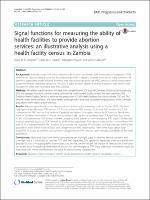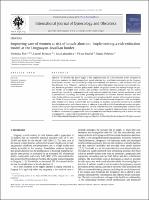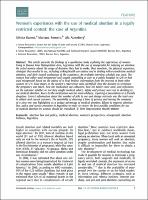Hidden realities: What women do when they want to terminate an unwanted pregnancy in Bolivia

Ver/
Fecha
2012Autor
Bury, L
Aliaga Bruch, S
Machicao Barbery, X
Garcia Pimentel, F
Metadatos
Mostrar el registro completo del ítemResumen
OBJECTIVE: To explore women's experience of unwanted pregnancy and induced abortion in Bolivia, where nearly all induced abortions are carried out in clandestine, unregulated, and unsafe conditions. METHODS: Qualitative and quantitative research methods, including focus group discussions, in-depth interviews and a structured survey of women of reproductive age, were used to explore the experience of unwanted pregnancy and induced abortion in poor urban areas of 5 Bolivian cities. RESULTS: Of the 1175 sexually experienced women surveyed, 13% reported having had an induced abortion. The methods they tried included surgical abortion, taking misoprostol, drinking herbal and chemical preparations, and inflicting physical trauma on themselves. Many women made multiple attempts before successfully terminating a pregnancy. Lack of knowledge and confusion about how to use misoprostol may have contributed to the complications that resulted in seeking postabortion care. CONCLUSION: Increased access to accurate information and counseling about abortion options are paramount if women are to make informed decisions and minimize health risks.
Colecciones
- Artículos [158]
Ítems relacionados
Mostrando ítems relacionados por Título, autor o materia.
-
Signal functions for measuring the ability of health facilities to provide abortion services: an illustrative analysis using a health facility census in Zambia
Campbell, Oona; Aquino, Estela; Vwalika, Bellington; Gabrysch, Sabine (BMC Pregnancy and childbirth, 2016)Background Annually, around 44 million abortions are induced worldwide. Safe termination of pregnancy (TOP) services can reduce maternal mortality, but induced abortion is illegal or severely restricted in many countries. ... -
Improving care of women at risk of unsafe abortion: implementing a risk-reduction model at the Uruguayan-Brazilian border
Fiol, V; Briozzo, L; Labandera, A; Recchi, V; Piñeyro, M (2012)OBJECTIVE: To describe the initial stages of the implementation of a risk-reduction model designed by Iniciativas Sanitarias to shield women from unsafe abortion in a traditional community on the Uruguay-Brazil border. ... -
Women’s experiences with the use of medical abortion in a legally restricted context: the case of Argentina
Ramos, Silvina; Romero, Mariana; Aizenberg, Lila (Reproductive Health Matters, 2014)This article presents the findings of a qualitative study exploring the experiences of women living in Buenos Aires Metropolitan Area, Argentina, with the use of misoprostol for inducing an abortion. We asked women about ...


